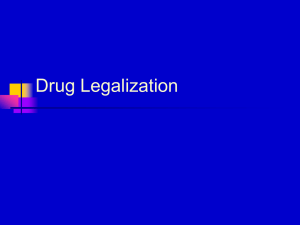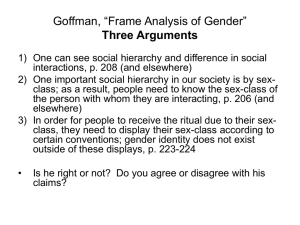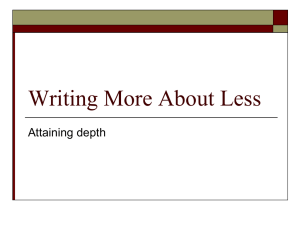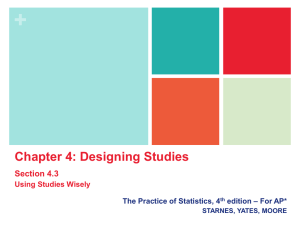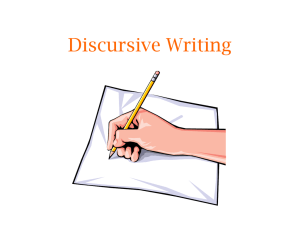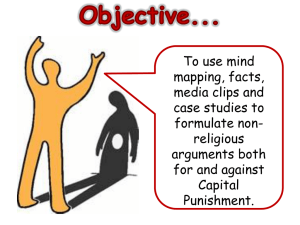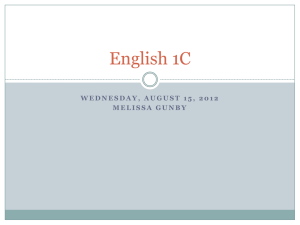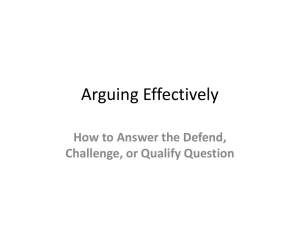Deductive Arguments & Inference Rules: Logic Presentation
advertisement
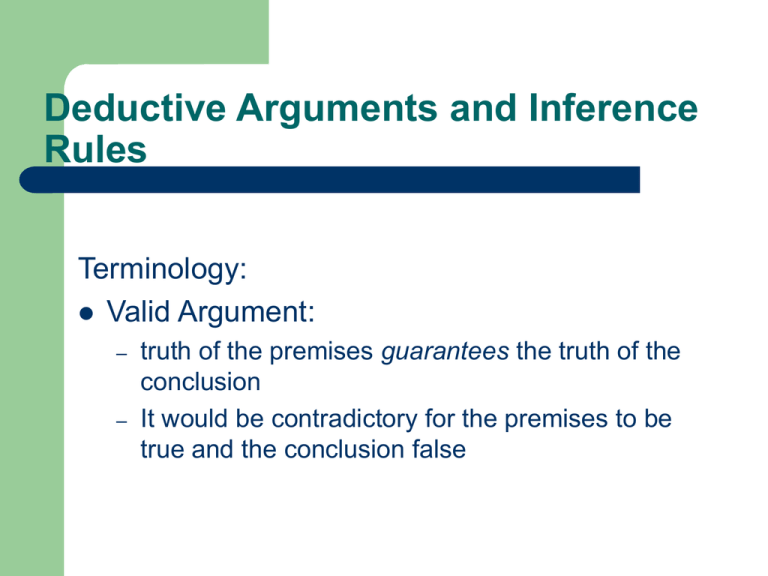
Deductive Arguments and Inference Rules Terminology: Valid Argument: – – truth of the premises guarantees the truth of the conclusion It would be contradictory for the premises to be true and the conclusion false Deductive Arguments and Inference Rules Sound Argument: A Valid argument with true premises. A sound argument is one for which both of the following are true: – – it would be contradictory for the premises to be true, but the conclusion false The premises are all true Deductive Arguments and Inference Rules Use correct terminology: Arguments are valid or invalid, sound or unsound Sentences (premises) are true or false Deductive Arguments and Inference Rules Common Valid Forms: 1.Modus Ponens (mode of putting) If p then q p Therefore, q Example: If the death penalty is abolished, murder rates will increase. The death penalty will be abolished Murder rates will increase Deductive Arguments and Inference Rules 2. Modus Tollens (mode of taking) If p then q Not q Therefore, not p Example: If determinism is false, then some events do not have a cause There is no event without a cause Therefore, determinism is true Deductive Arguments and Inference Rules More terminology: Antecedent: the “If” position Consequent: the “Then” position Example: If I wake up on time, I’ll make the 7 a.m. train I wake up on time= antecedent I’ll make the 7 a.m. train=consequent Deductive Arguments and Inference Rules Helpful terminology: IF p Then q p is a sufficient condition for q – a sufficient condition for ___ is a condition which, if met, guarantees that ___ is the case q is a necessary condition for p – a necessary condition for ___ is a condition that must be met in order for ___ to be the case Deductive Arguments and Inference Rules Evaluating arguments: Example: If the death penalty is abolished, murder rates will increase. The death penalty will be abolished. Therefore, murder rates will be increased STEP 1: make a dictionary d=death penalty is abolished; m=murder rates will increase Deductive Arguments and Inference Rules STEP #2: Put the argument into logical form P1. If d THEN m P2. d Therefore, m STEP #3: Is this a valid form? Yes—modus ponens Deductive Arguments and Inference Rules STEP #4: Is the argument Sound? Is the argument valid (is it in a valid form)? – Our example: yes Are all the premises true??? Which premise would you challenge? – – P1. If the death penalty is abolished, murder rates will increase or P2. The death penalty will be abolished Deductive Arguments and Inference Rules Translation problems: What about “only”? The phrase that immediately follows the word ‘only’ is the consequent Deductive Arguments and Inference Rules 3. Hypothetical Syllogism If p then q If q then r Therefore, If p then r Example If we establish strict gun laws, there will be fewer guns on the street If there are fewer guns on the street, there will be less crime Therefore, if we establish strict gun laws, there will be less crime Deductive Arguments and Inference Rules 4. Disjunctive Syllogism p or q Not-p Therefore, q Example: Either Gil is a Cubs fan or Gil is a fool. Gil is not a Cubs fan Gil is a fool Deductive Arguments and Inference Rules Disjunctive Syllogisms are tricky: The word “or” can have two meanings: Inclusive meaning: at least one of p or q is true and possibly both Exclusive meaning: either p or q is true but not both Deductive Arguments and Inference Rules Why is this important?? We need to know what we can infer: P1. p or q P2. p Inclusive sense: nothing can be inferred from P1 and P2 Exclusive sense: can infer not-q Exercises Either the White Sox will win the world series or Chicago’s southsiders will be disappointed. The White Sox will win the world series. So, Chicago’s southsiders will not be disappointed. – – – – – Make a dictionary P1. Either W or D P2. W Therefore, not D exclusive or inclusive??? More Exercices If the President does not raise taxes to save Social Security, then Social Security will collapse. The President has decided to raise taxes to save Social Security. Therefore, Social Security will not collapse – – – – – Make a dictionary P1. If not R then C P2. R Therefore, Not C Invalid More exercises Either Mugabe will leave office or there will be continued unrest in Zimbabwe. If Mugabe leaves office, the US will send millions in aid to Zimbabwe. There will not be continued unrest in Zimbabwe. Thus, the US will send millions in aid to Zimbabwe. (use M, U, A). P1. Either M or U If M then A Not U Therefore, A Valid

